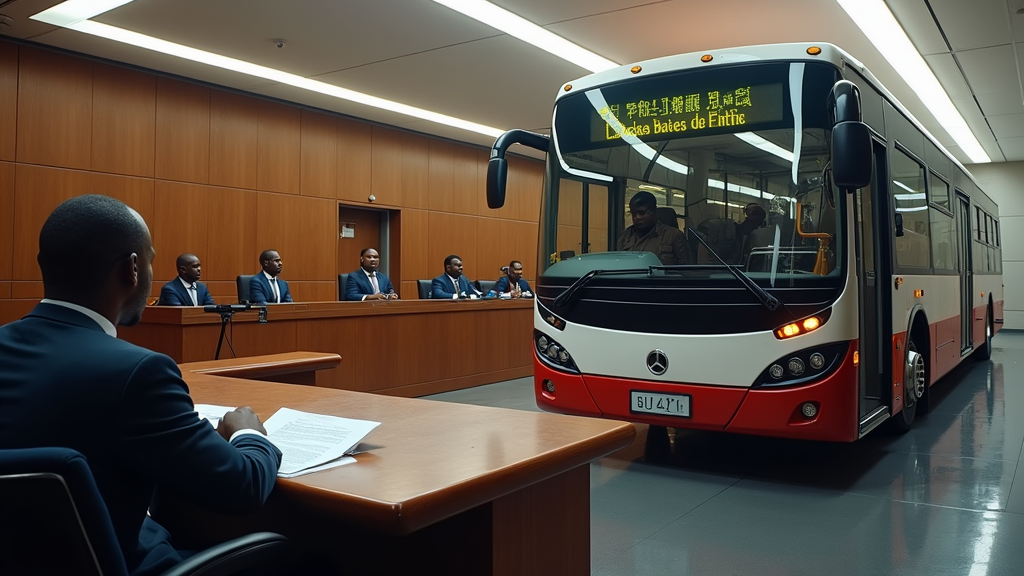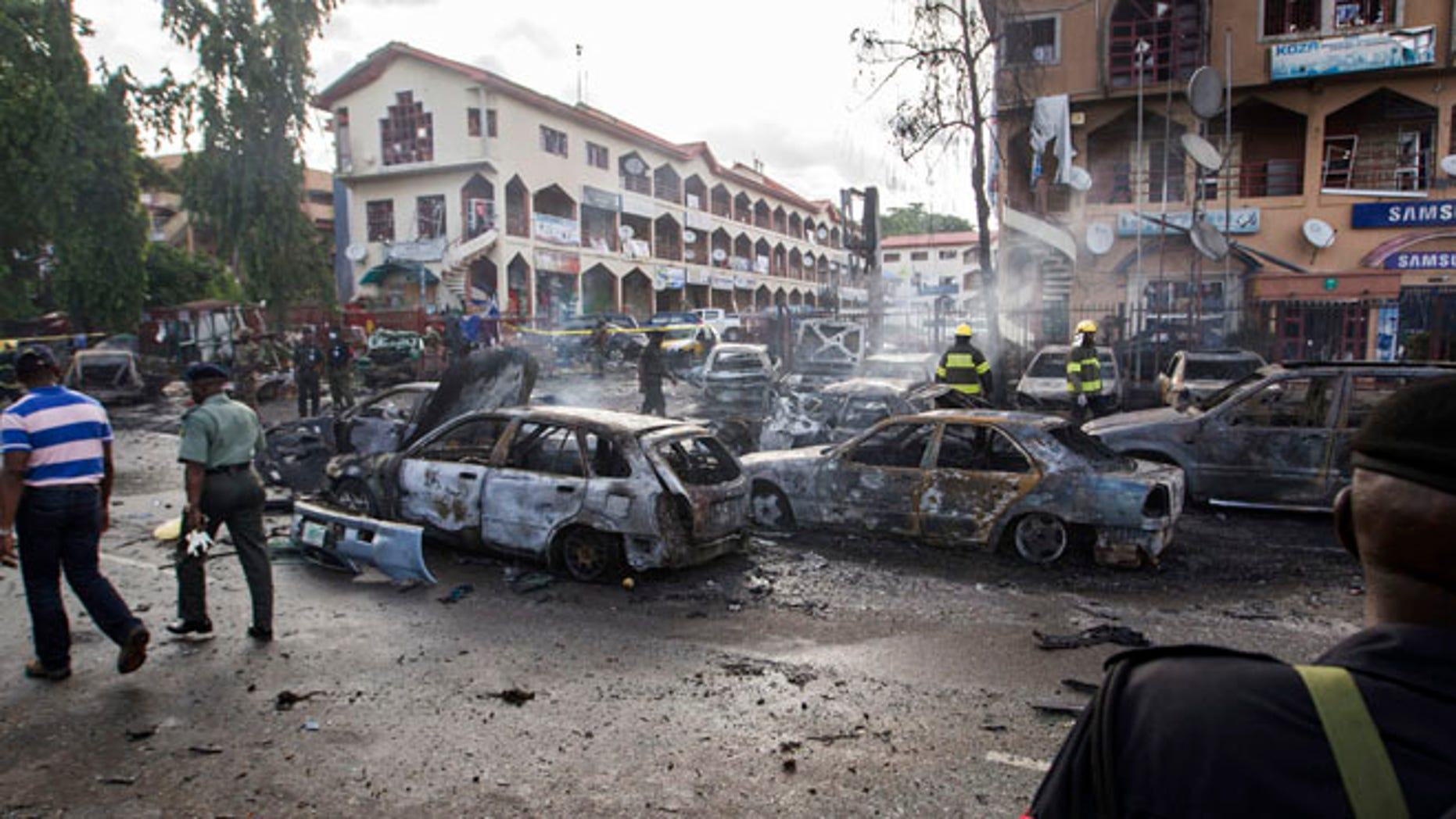Oluwabamide Ayanwola, a vibrant 22-year-old, has become a symbol of the quest for justice in the highly publicized Bamise murder case that has captured the attention of many in Nigeria. After her tragic disappearance following a ride on a Bus Rapid Transit (BRT) vehicle in Lagos, her family has vehemently accused the Lagos State government of stalling the trial of Andrew Nice Ominikoron, the BRT driver implicated in her death. As the third anniversary of Bamise’s murder approaches, her family’s frustration grows over the seemingly endless delays and lack of progress in the legal proceedings. The call for justice for Bamise echoes through the community, with many demanding accountability from the government for what they perceive as a failure to act decisively. Pelumi Ayanwola, Bamise’s brother, has become a vocal advocate for the family, highlighting the need for urgent action as they navigate this painful chapter in their lives.
The case surrounding Oluwabamide Ayanwola has sparked significant public interest, particularly in relation to the ongoing trial of the accused BRT driver. As the anniversary of her death approaches, discussions about the legal intricacies of the Bamise murder investigation continue to unfold. Many are questioning the response of the Lagos State authorities amidst claims of a cover-up and the apparent lack of urgency in bringing justice to light. The family’s persistent outcry for accountability has shed light on the broader issues within the justice system, as they seek answers not just for Bamise, but for all victims of similar tragedies. The community remains united in their demand for justice, hoping to see significant progress in the trial and broader reforms in public transportation safety.
The Ongoing Trial of Andrew Nice Ominikoron in the Bamise Murder Case
The trial of Andrew Nice Ominikoron, the BRT driver accused of murdering Oluwabamide Ayanwola, has been plagued by delays that have frustrated her family and supporters. As the third anniversary of Bamise’s death approaches, the Lagos State government faces mounting criticism for its handling of the case. With multiple adjournments and a lack of transparency regarding the proceedings, many are questioning the commitment of the authorities to deliver justice for Bamise. The family asserts that these delays are not just procedural but indicative of a deeper failure within the system to address the heinous crime that has left a profound impact on the community.
Moreover, the absence of other suspects from the trial raises concerns about the thoroughness of the investigation. Witnesses reported that there were additional individuals in the BRT vehicle during the incident, yet the focus remains largely on the driver alone. This selective prosecution has fueled accusations of negligence and a potential cover-up by the Lagos State government, as families often feel that their voices are ignored in the pursuit of justice. The Ayanwola family, particularly Pelumi Ayanwola, has been vocal in demanding accountability, highlighting the need for a more robust legal framework that prioritizes victims’ rights.
Calls for Justice: The Family’s Fight for Oluwabamide Ayanwola
The family of Oluwabamide Ayanwola has been relentless in their pursuit of justice, rallying supporters and raising awareness about the challenges they face. Pelumi Ayanwola, her elder brother, has emerged as a prominent voice in advocating for transparency in the trial proceedings of Andrew Nice Ominikoron. He has emphasized the emotional toll that the protracted legal battles have taken on their family, stating that the promised support from the Lagos State government has not materialized as they had hoped. Instead, they feel abandoned, struggling to navigate a legal system that seems indifferent to their plight.
In recent discussions, Pelumi has called for a more vigorous response from the Lagos State government, urging a reevaluation of the priorities in the Bamise murder case. He argues that the evidence collected, including Bamise’s recorded voice notes, should be presented in court urgently to ensure that justice is served. The family’s frustration is compounded by the feeling that the case has been sidelined, despite the significant public interest and emotional impact it has had on the community. Their ongoing fight signifies not only a quest for justice for Oluwabamide Ayanwola but also a call for reforms in the handling of similar cases to prevent other families from experiencing such profound loss.
The Role of the Lagos State Government in the Bamise Murder Case
The Lagos State government’s role in the Bamise murder case has come under intense scrutiny, particularly regarding the perceived delays and lack of action in prosecuting those involved. The Ayanwola family has voiced their concerns that the state is not doing enough to ensure that justice is served for Oluwabamide Ayanwola. As more time passes without significant progress in the trial of Andrew Nice Ominikoron, doubts grow about the government’s commitment to protecting its citizens and upholding the law. This situation reflects a broader issue within the judicial system that can leave families feeling powerless and frustrated.
In light of these challenges, the Ayanwola family has been vocal about their need for support from the Lagos State government, highlighting the importance of accountability and transparency. They believe that the government should not only facilitate the trial but also actively seek out other individuals connected to the crime. The family’s insistence on justice serves as a reminder of the responsibilities that governments have to their citizens, particularly in cases involving violent crimes. The ongoing dialogue surrounding Oluwabamide’s case underscores the critical need for systemic change to address the failures that have allowed such tragedies to occur.
Public Response and Advocacy for Justice for Bamise
The public response to the Bamise murder case has been overwhelming, with many citizens rallying around the Ayanwola family in their quest for justice. Social media campaigns and public demonstrations have highlighted the need for accountability and swift action from the Lagos State government. The emotional weight of Oluwabamide Ayanwola’s tragic story has resonated deeply within the community, igniting a call for change in how such cases are handled. Activists and concerned citizens have mobilized to demand that the authorities prioritize the resolution of the case and ensure that justice is served.
In addition to raising awareness, various advocacy groups have begun to scrutinize the legal processes surrounding cases like Bamise’s. They argue that the prolonged delays and lack of urgency in the trial of Andrew Nice Ominikoron reflect systemic issues that must be addressed. The call for justice for Bamise is not just about one family’s tragedy; it represents a broader demand for reform in the criminal justice system to ensure that victims and their families are treated with dignity and respect. The collective efforts of the community and advocacy groups have created a powerful movement aimed at transforming the narrative surrounding crime and justice in Lagos State.
The Impact of Oluwabamide Ayanwola’s Case on Lagos Society
The case of Oluwabamide Ayanwola has had a profound impact on Lagos society, sparking discussions around safety, accountability, and the role of public transport. As more individuals take to the Bus Rapid Transit system, concerns about passenger safety have escalated. The tragic circumstances surrounding Bamise’s death have prompted citizens to demand stricter regulations and better oversight of public transportation services. This case has not only highlighted the dangers present but has also galvanized the community to advocate for improved safety measures to protect vulnerable passengers.
Furthermore, the emotional response to Oluwabamide’s story has created a sense of solidarity among citizens who share similar fears and frustrations regarding crime in Lagos. The ongoing dialogue surrounding the trial of Andrew Nice Ominikoron has become a catalyst for broader conversations about justice and the effectiveness of the legal system. Public forums and discussions have emerged, allowing citizens to voice their concerns and push for changes that could prevent future tragedies. The legacy of Bamise’s case is not just about seeking justice; it has become a movement for change, aiming to foster a safer environment for all Lagos residents.
Challenges Faced by Families Seeking Justice in Lagos
Families like that of Oluwabamide Ayanwola face numerous challenges when seeking justice for their loved ones in Lagos. The complexities of the legal system can be daunting, especially for those who are not familiar with the processes involved. Delays in trials, lack of communication from authorities, and the emotional toll of reliving their loved ones’ tragic stories can often leave families feeling hopeless. The Ayanwola family’s experience illustrates the struggles many face in navigating a system that seems to prioritize procedural issues over victims’ needs.
Moreover, the fear of public backlash or being perceived as burdensome can discourage families from speaking out about their experiences. The Ayanwola family, however, has shown remarkable resilience in their fight for justice, emphasizing the importance of community support. Their story sheds light on the need for reforms that empower families in their pursuit of justice, ensuring they have the resources and guidance necessary to navigate the complexities of the legal system. As they continue to advocate for Oluwabamide, they highlight the need for a more compassionate and responsive approach from the Lagos State government.
The Significance of Bamise’s Voice Notes as Evidence
One of the critical pieces of evidence in the Bamise murder case is the voice notes recorded by Oluwabamide Ayanwola before her tragic death. These recordings have been cited by the Ayanwola family as crucial to understanding the events leading up to her disappearance. They not only provide insight into her state of mind but also serve as potential evidence against Andrew Nice Ominikoron. The family’s frustration over the delayed presentation of this evidence in court underscores the importance of timely legal action in securing a fair trial.
The inclusion of Bamise’s voice notes in the trial could potentially change the course of proceedings, and the family’s ongoing advocacy stresses the necessity of bringing such evidence to light. The emotional weight of these recordings adds another layer to the case, reminding both the public and the legal system of the human impact behind the statistics. As the Ayanwola family continues to push for justice, they hope that the power of Bamise’s voice will not only resonate in the courtroom but also inspire a renewed commitment to ensuring justice for victims of violent crimes.
Reflections on the Future of Justice for Victims in Lagos
The ongoing Bamise murder case serves as a poignant reminder of the challenges faced by victims’ families in Lagos. As the Ayanwola family continues to seek justice for Oluwabamide, they reflect on the systemic issues that hinder the legal process. The need for reform in the judicial system has never been more apparent, as families often find themselves at the mercy of an inefficient and often opaque legal framework. The hope is that by shedding light on Bamise’s case, broader changes can be initiated to ensure that victims’ rights are prioritized and that families receive the support they deserve.
Looking ahead, the Ayanwola family’s fight for justice highlights the importance of community engagement and advocacy. As more citizens become aware of the intricacies of the legal process and the challenges faced by families like theirs, there is potential for collective action to drive reform. The legacy of Oluwabamide Ayanwola may ultimately serve as a catalyst for change, inspiring a more just and equitable system for all victims of crime in Lagos. The pursuit of justice for Bamise is about more than one case; it is about reshaping the narrative around crime, safety, and accountability in society.
Frequently Asked Questions
What is the background of the Oluwabamide Ayanwola case and its connection to the Bamise murder case?
Oluwabamide Ayanwola, also known as Bamise, was a 22-year-old woman who went missing after boarding a Bus Rapid Transit (BRT) bus in Lagos on February 26, 2022. Her disappearance led to widespread outrage after her body was discovered, and Andrew Nice Ominikoron, the BRT driver, was arrested in connection with her murder. The case has drawn attention to issues of safety in public transportation and the need for justice in the Bamise murder case.
Why has the Lagos State government been accused of delaying the BRT driver trial related to Oluwabamide Ayanwola?
The family of Oluwabamide Ayanwola has accused the Lagos State government of deliberately delaying the trial of Andrew Nice Ominikoron, the BRT driver linked to her murder. They allege that the trial has been plagued by multiple adjournments and a lack of progress, particularly as the third anniversary of Bamise’s death approaches on February 28, 2025.
What evidence has been discussed in the trial of the BRT driver involved in Oluwabamide Ayanwola’s murder?
During the trial of Andrew Nice Ominikoron, evidence including voice notes recorded by Oluwabamide Ayanwola before her death has been highlighted. However, Pelumi Ayanwola, her brother, expressed frustration over the delayed presentation of this evidence in court, suggesting that the prosecution has not acted swiftly enough to ensure justice for Bamise.
How has Pelumi Ayanwola described the government’s response to his sister’s case?
Pelumi Ayanwola has criticized the Lagos State government for its lack of action and support in the pursuit of justice for his sister, Oluwabamide Ayanwola. He articulated feelings of abandonment and frustration, stating that the government’s actions suggest a cover-up, as only the BRT driver is currently facing charges despite others being present in the vehicle at the time.
What promises were made by the Lagos State government regarding the Oluwabamide Ayanwola case?
After the tragic incident involving Oluwabamide Ayanwola, the Governor’s wife visited the family and promised support from the Lagos State government. However, Pelumi Ayanwola later expressed disappointment, claiming that these promises have not materialized, and the family feels neglected as they seek justice for Bamise.
What are the ongoing efforts for justice for Oluwabamide Ayanwola in light of the Bamise murder case?
The family of Oluwabamide Ayanwola continues to advocate for justice, calling attention to the delays in the trial of the BRT driver. They have actively participated in discussions and media engagements to raise awareness about the need for timely legal proceedings and accountability from the Lagos State government.
What has the public reaction been to the Oluwabamide Ayanwola case and the trial of the BRT driver?
The public reaction to the Oluwabamide Ayanwola case has been one of outrage and concern regarding safety in public transportation in Lagos. Many have rallied for justice for Bamise, demanding accountability from the Lagos State government and a thorough investigation into the circumstances surrounding her death and the ongoing trial of Andrew Nice Ominikoron.
| Key Points | Details |
|---|---|
| Missing Person | Oluwabamide Ayanwola, 22, went missing after boarding a BRT vehicle in Lagos. |
| Accusation Against Government | Family accuses Lagos State government of delaying the trial of Andrew Nice Ominikoron, the arrested BRT driver linked to Bamise’s murder. |
| Trial Delays | The trial has faced multiple adjournments, with no significant progress, marking February 28, 2025, as the third anniversary of Bamise’s death. |
| Frustration Expressed | Pelumi, Bamise’s brother, expressed frustration over the delays and lack of evidence presentation in court. |
| Incident Details | Bamise went missing on February 26, 2022, after boarding a BRT bus from Chevron Bus Stop to Oshodi and was later found dead on Carter Bridge. |
| Government Inaction | Pelumi criticized the government for neglecting its duty, implying a possible cover-up, as only the driver is facing charges despite others being present. |
| Initial Support | The family initially felt hopeful after the Governor’s wife’s visit but now feel abandoned in their quest for justice. |
Summary
Oluwabamide Ayanwola’s family is facing significant challenges in their pursuit of justice for her tragic death. The government’s alleged inaction and delays in the trial of the accused BRT driver have left them feeling frustrated and neglected. As the third anniversary of Bamise’s death approaches, it is crucial for the relevant authorities to address these concerns and ensure a timely resolution to this heartbreaking case.



